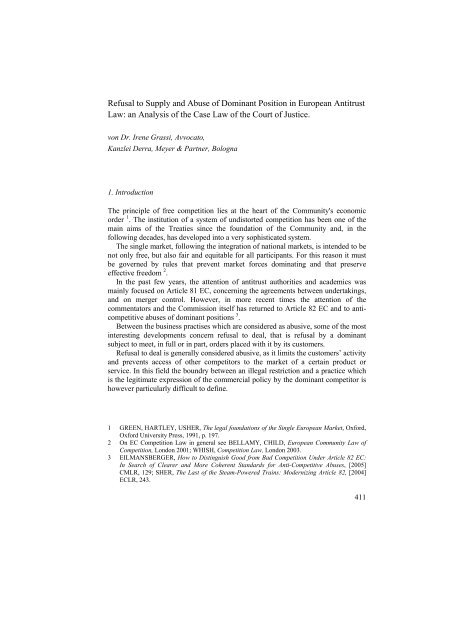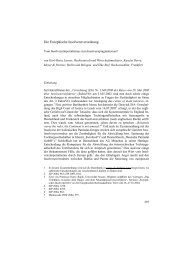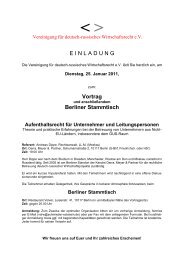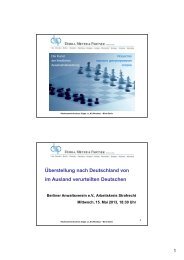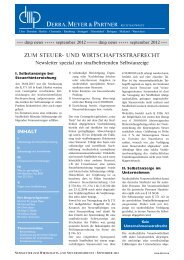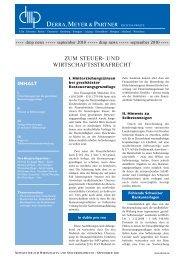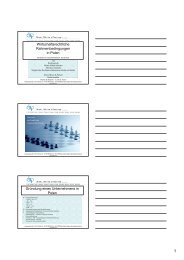Refusal to Supply and Abuse of Dominant Position in European ...
Refusal to Supply and Abuse of Dominant Position in European ...
Refusal to Supply and Abuse of Dominant Position in European ...
You also want an ePaper? Increase the reach of your titles
YUMPU automatically turns print PDFs into web optimized ePapers that Google loves.
<strong>Refusal</strong> <strong>to</strong> <strong>Supply</strong> <strong>and</strong> <strong>Abuse</strong> <strong>of</strong> <strong>Dom<strong>in</strong>ant</strong> <strong>Position</strong> <strong>in</strong> <strong>European</strong> Antitrust<br />
Law: an Analysis <strong>of</strong> the Case Law <strong>of</strong> the Court <strong>of</strong> Justice.<br />
von Dr. Irene Grassi, Avvoca<strong>to</strong>,<br />
Kanzlei Derra, Meyer & Partner, Bologna<br />
1. Introduction<br />
The pr<strong>in</strong>ciple <strong>of</strong> free competition lies at the heart <strong>of</strong> the Community's economic<br />
order 1 . The <strong>in</strong>stitution <strong>of</strong> a system <strong>of</strong> undis<strong>to</strong>rted competition has been one <strong>of</strong> the<br />
ma<strong>in</strong> aims <strong>of</strong> the Treaties s<strong>in</strong>ce the foundation <strong>of</strong> the Community <strong>and</strong>, <strong>in</strong> the<br />
follow<strong>in</strong>g decades, has developed <strong>in</strong><strong>to</strong> a very sophisticated system.<br />
The s<strong>in</strong>gle market, follow<strong>in</strong>g the <strong>in</strong>tegration <strong>of</strong> national markets, is <strong>in</strong>tended <strong>to</strong> be<br />
not only free, but also fair <strong>and</strong> equitable for all participants. For this reason it must<br />
be governed by rules that prevent market forces dom<strong>in</strong>at<strong>in</strong>g <strong>and</strong> that preserve<br />
effective freedom 2 .<br />
In the past few years, the attention <strong>of</strong> antitrust authorities <strong>and</strong> academics was<br />
ma<strong>in</strong>ly focused on Article 81 EC, concern<strong>in</strong>g the agreements between undertak<strong>in</strong>gs,<br />
<strong>and</strong> on merger control. However, <strong>in</strong> more recent times the attention <strong>of</strong> the<br />
commenta<strong>to</strong>rs <strong>and</strong> the Commission itself has returned <strong>to</strong> Article 82 EC <strong>and</strong> <strong>to</strong> anticompetitive<br />
abuses <strong>of</strong> dom<strong>in</strong>ant positions 3 .<br />
Between the bus<strong>in</strong>ess practises which are considered as abusive, some <strong>of</strong> the most<br />
<strong>in</strong>terest<strong>in</strong>g developments concern refusal <strong>to</strong> deal, that is refusal by a dom<strong>in</strong>ant<br />
subject <strong>to</strong> meet, <strong>in</strong> full or <strong>in</strong> part, orders placed with it by its cus<strong>to</strong>mers.<br />
<strong>Refusal</strong> <strong>to</strong> deal is generally considered abusive, as it limits the cus<strong>to</strong>mers’ activity<br />
<strong>and</strong> prevents access <strong>of</strong> other competi<strong>to</strong>rs <strong>to</strong> the market <strong>of</strong> a certa<strong>in</strong> product or<br />
service. In this field the boundry between an illegal restriction <strong>and</strong> a practice which<br />
is the legitimate expression <strong>of</strong> the commercial policy by the dom<strong>in</strong>ant competi<strong>to</strong>r is<br />
however particularly difficult <strong>to</strong> def<strong>in</strong>e.<br />
1 GREEN, HARTLEY, USHER, The legal foundations <strong>of</strong> the S<strong>in</strong>gle <strong>European</strong> Market, Oxford,<br />
Oxford University Press, 1991, p. 197.<br />
2 On EC Competition Law <strong>in</strong> general see BELLAMY, CHILD, <strong>European</strong> Community Law <strong>of</strong><br />
Competition, London 2001; WHISH, Competition Law, London 2003.<br />
3 EILMANSBERGER, How <strong>to</strong> Dist<strong>in</strong>guish Good from Bad Competition Under Article 82 EC:<br />
In Search <strong>of</strong> Clearer <strong>and</strong> More Coherent St<strong>and</strong>ards for Anti-Competitive <strong>Abuse</strong>s, [2005]<br />
CMLR, 129; SHER, The Last <strong>of</strong> the Steam-Powered Tra<strong>in</strong>s: Moderniz<strong>in</strong>g Article 82, [2004]<br />
ECLR, 243.<br />
411
In a case recently argued before the <strong>European</strong> Court <strong>of</strong> Justice 4 , a pharmaceutical<br />
<strong>in</strong>dustry refused <strong>to</strong> supply products <strong>in</strong> order <strong>to</strong> prevent parallel trade on the part <strong>of</strong><br />
the wholesalers 5 . Unfortunately for the present discussion, the Court concluded it<br />
had no jurisdiction <strong>in</strong> the case <strong>and</strong> therefore did not rule on the merits. The questions<br />
posed by the referr<strong>in</strong>g authority rema<strong>in</strong> therefore open.<br />
This paper reviews the case law <strong>of</strong> the Court concern<strong>in</strong>g refusal <strong>to</strong> deal, as well as<br />
the specific conditions <strong>of</strong> competition applicable <strong>in</strong> the highly regulated<br />
pharmaceutical market. It subsequently exam<strong>in</strong>es the op<strong>in</strong>ion <strong>of</strong> the Advocate<br />
General Jacobs <strong>in</strong> the Syfait case, explor<strong>in</strong>g possible alternative solutions <strong>to</strong> the<br />
question.<br />
2. <strong>Refusal</strong> <strong>to</strong> <strong>Supply</strong> as an <strong>Abuse</strong> <strong>of</strong> a <strong>Dom<strong>in</strong>ant</strong> <strong>Position</strong><br />
The Court <strong>of</strong> Justice first outl<strong>in</strong>ed an obligation <strong>of</strong> undertak<strong>in</strong>gs that are <strong>in</strong> a<br />
dom<strong>in</strong>ant position <strong>in</strong> the sense <strong>of</strong> Article 82 <strong>to</strong> meet <strong>in</strong> full the orders <strong>of</strong> their<br />
cus<strong>to</strong>mers <strong>in</strong> the case ICI <strong>and</strong> Commercial Solvents 6 .<br />
The case orig<strong>in</strong>ated from a refusal <strong>of</strong> a dom<strong>in</strong>ant producer <strong>to</strong> supply one <strong>of</strong> its<br />
cus<strong>to</strong>mers with a raw material for the manufacture <strong>of</strong> ethambu<strong>to</strong>l, the producer<br />
hav<strong>in</strong>g decided <strong>to</strong> develop its own specialities based on that substance <strong>and</strong> therefore<br />
<strong>to</strong> enter <strong>in</strong> competition with its former cus<strong>to</strong>mers. The refusal <strong>to</strong> supply had<br />
therefore the aim <strong>to</strong> facilitate its own access <strong>to</strong> the market for the derivatives.<br />
The Court ruled that ‘an undertak<strong>in</strong>g which has a dom<strong>in</strong>ant position <strong>in</strong> the market<br />
<strong>of</strong> raw materials <strong>and</strong> which, with the object <strong>of</strong> reserv<strong>in</strong>g such raw material for<br />
manufactur<strong>in</strong>g its own derivates, refuses <strong>to</strong> supply a cus<strong>to</strong>mer, which is itself a<br />
manufacturer <strong>of</strong> these derivatives, <strong>and</strong> therefore risks elim<strong>in</strong>at<strong>in</strong>g all competition on<br />
the part <strong>of</strong> this cus<strong>to</strong>mer, is abus<strong>in</strong>g its dom<strong>in</strong>ant position’.<br />
The above pr<strong>in</strong>ciple was confirmed <strong>and</strong> developed some years later, <strong>in</strong> United<br />
Br<strong>and</strong>s 7 , a case concern<strong>in</strong>g the refusal <strong>of</strong> the Chiquita banana producer <strong>to</strong> supply a<br />
cus<strong>to</strong>mer that had participated <strong>in</strong> an advertis<strong>in</strong>g campaign for one <strong>of</strong> Chiquita’s<br />
competi<strong>to</strong>rs.<br />
The Court declared that ‘an undertak<strong>in</strong>g <strong>in</strong> a dom<strong>in</strong>ant position for the purpose <strong>of</strong><br />
market<strong>in</strong>g a product – which cashes <strong>in</strong> on the reputation <strong>of</strong> a br<strong>and</strong> name known <strong>to</strong><br />
<strong>and</strong> valued by the consumers – cannot s<strong>to</strong>p supply<strong>in</strong>g a long st<strong>and</strong><strong>in</strong>g cus<strong>to</strong>mer who<br />
4 Judgment <strong>of</strong> 31 May 2005, case C-53/03, Syfait <strong>and</strong> Others v. GSK.<br />
5 The case generated considerable expectations, as <strong>in</strong> a previous judgment on 6 January 2004,<br />
case C-2/01, Bayer, [2004] ECR I-23, the Court had considered export bans <strong>in</strong>tended <strong>to</strong><br />
prevent parallel trade not <strong>to</strong> constitute an agreement under Article 81. See BROWN, Bayer v.<br />
Commission: the ECJ Agrees, [2004] ECLR 386.<br />
6 Judgment <strong>of</strong> 6 March 1974, jo<strong>in</strong>ed cases 6/73 <strong>and</strong> 7/73 [1974] ECR 223. A wide selection <strong>of</strong><br />
EC antitrust cases can be found <strong>in</strong> Italian <strong>in</strong> MANZINI, Antitrust applica<strong>to</strong> – Raccolta<br />
sistematica della giurisprudenza comunitaria, Tor<strong>in</strong>o, Giappichelli 2004.<br />
7 Judgement <strong>of</strong> 14 February 1978, Case 27/76 [1978] ECR 207.<br />
412
abides by regular commercial practice, if the orders placed by that cus<strong>to</strong>mer are <strong>in</strong><br />
no way out <strong>of</strong> the ord<strong>in</strong>ary’.<br />
However, the prohibition is not absolute: a refusal <strong>to</strong> supply may be justified by<br />
the right <strong>of</strong> the dom<strong>in</strong>ant undertak<strong>in</strong>g ‘<strong>to</strong> take such reasonable steps as it deems<br />
appropriate <strong>to</strong> protect its [commercial] <strong>in</strong>terests’, although ‘such behaviour cannot<br />
be countenanced if its actual purpose is <strong>to</strong> strengthen this dom<strong>in</strong>ant position <strong>and</strong><br />
abuse it’. In other words, the refusal <strong>to</strong> supply may be legitimate as a commercial<br />
response <strong>to</strong> competi<strong>to</strong>rs' attacks, but it must be proportionate <strong>to</strong> the threat, tak<strong>in</strong>g<br />
<strong>in</strong><strong>to</strong> account the economic strength <strong>of</strong> the undertak<strong>in</strong>gs confront<strong>in</strong>g each other.<br />
On the fact <strong>of</strong> United Br<strong>and</strong>s, the Court found that the decision <strong>to</strong> refuse <strong>to</strong><br />
supply was disproportionate, be<strong>in</strong>g <strong>in</strong> excess <strong>of</strong> what might reasonably be<br />
contemplated as a sanction for the conduct <strong>of</strong> the cus<strong>to</strong>mer <strong>and</strong>, further, that the<br />
conduct adopted by United Br<strong>and</strong>s was <strong>in</strong>tended <strong>to</strong> have a serious effect on<br />
competition by discourag<strong>in</strong>g small <strong>and</strong> medium sized firms from giv<strong>in</strong>g preference<br />
<strong>to</strong> competi<strong>to</strong>rs' goods.<br />
Application <strong>of</strong> the proportionality test yielded a different result <strong>in</strong> the BP case 8 ,<br />
where the Court judged as justified the decision <strong>of</strong> BP, <strong>in</strong> a period <strong>of</strong> fuel shortage,<br />
not <strong>to</strong> supply a cus<strong>to</strong>mer (or <strong>to</strong> apply <strong>to</strong> him greater rates <strong>of</strong> reduction than <strong>to</strong> other<br />
cus<strong>to</strong>mers), due <strong>to</strong> the fact that it was only an occasional cus<strong>to</strong>mer when the crisis<br />
began, hav<strong>in</strong>g ceased <strong>to</strong> have a long-term contract with BP <strong>in</strong> the year prior <strong>to</strong> the<br />
oil crisis.<br />
It was therefore considered as justified <strong>to</strong> apply different rates <strong>of</strong> reduction <strong>to</strong><br />
occasional cus<strong>to</strong>mers than <strong>to</strong> regular ones. It is <strong>in</strong>terest<strong>in</strong>g <strong>to</strong> note that the<br />
Commission 9 had considered the conduct <strong>of</strong> BP abusive, evaluat<strong>in</strong>g habitual<br />
cus<strong>to</strong>mers under different criteria.<br />
The same pr<strong>in</strong>ciple does not apply however if the dom<strong>in</strong>ant undertak<strong>in</strong>g<br />
discrim<strong>in</strong>ates among the cus<strong>to</strong>mers, preferr<strong>in</strong>g "loyal" cus<strong>to</strong>mers <strong>to</strong> those who buy<br />
also from other suppliers. The Court <strong>of</strong> First Instance 10 judged that whilst it is open<br />
<strong>to</strong> an undertak<strong>in</strong>g <strong>in</strong> a dom<strong>in</strong>ant position, <strong>in</strong> times <strong>of</strong> shortage, <strong>to</strong> lay down criteria<br />
for accord<strong>in</strong>g priority <strong>in</strong> meet<strong>in</strong>g orders, those criteria must be objective, must not<br />
be discrim<strong>in</strong>a<strong>to</strong>ry <strong>in</strong> any way <strong>and</strong> must be objectively justified, <strong>in</strong> accordance with<br />
the rules govern<strong>in</strong>g fair competition, between economic opera<strong>to</strong>rs. That requirement<br />
is not met by a criterion based on a dist<strong>in</strong>ction between cus<strong>to</strong>mers who obta<strong>in</strong> their<br />
supplies only from the undertak<strong>in</strong>g hold<strong>in</strong>g the dom<strong>in</strong>ant position <strong>and</strong> those who<br />
also market products bought from certa<strong>in</strong> <strong>of</strong> its competi<strong>to</strong>rs. The behaviour was<br />
deemed as anti-competitive by reason <strong>of</strong> the discrim<strong>in</strong>a<strong>to</strong>ry purpose that it pursues<br />
<strong>and</strong> the exclusionary effect that may result from it.<br />
8 Judgement <strong>of</strong> 29 June 1978, Benz<strong>in</strong>e en Petroleum <strong>and</strong> others v. Commission, Case 77/77<br />
[1978] ECR 1513.<br />
9 Decision 77/327/EEC (OJ 1977, L 1/17).<br />
10 Judgment <strong>of</strong> the Court <strong>of</strong> First Instance <strong>of</strong> 1 April 1993, case T-65/89, BPB Industries <strong>and</strong><br />
Bitish Gypsum v. Commission, [1993] ECR II-389.<br />
413
A further confirmation <strong>of</strong> the above pr<strong>in</strong>ciples comes from the Telemarket<strong>in</strong>g<br />
case 11 , concern<strong>in</strong>g a Belgian television broadcaster also carry<strong>in</strong>g out an ancillary<br />
activity <strong>of</strong> telephone market<strong>in</strong>g. In order <strong>to</strong> protect its position <strong>in</strong> the latter market,<br />
the dom<strong>in</strong>ant undertak<strong>in</strong>g refused <strong>to</strong> sell television time <strong>to</strong> competi<strong>to</strong>rs <strong>in</strong> the<br />
telephone market<strong>in</strong>g <strong>and</strong> refused <strong>to</strong> sell time <strong>to</strong> advertisers for advertisements which<br />
<strong>in</strong>volved an <strong>in</strong>vitation <strong>to</strong> make a telephone call unless the telephone number used<br />
was that <strong>of</strong> its own telephone market<strong>in</strong>g operation.<br />
Consistent with the former case-law, the Court ruled that an abuse <strong>of</strong> a dom<strong>in</strong>ant<br />
position is committed<br />
‘where, without any objective necessity, an undertak<strong>in</strong>g hold<strong>in</strong>g a dom<strong>in</strong>ant position on a<br />
particular market reserves <strong>to</strong> itself an ancillary activity which might be carried out by another<br />
undertak<strong>in</strong>g as part <strong>of</strong> its activities on a neighbour<strong>in</strong>g but separate market, with the possibility<br />
<strong>of</strong> elim<strong>in</strong>at<strong>in</strong>g all competition from such undertak<strong>in</strong>g’.<br />
An <strong>in</strong>terest<strong>in</strong>g development <strong>of</strong> the case law on refusal <strong>to</strong> supply concerns the<br />
exercise <strong>of</strong> <strong>in</strong>tellectual property rights.<br />
In its judgment <strong>in</strong> the Volvo case 12 , the Court exam<strong>in</strong>ed a refusal, on the part <strong>of</strong><br />
the Volvo car manufacturer, <strong>to</strong> grant licences <strong>to</strong> produce replacement body panels.<br />
The Court rul<strong>in</strong>g was that the right <strong>of</strong> a proprie<strong>to</strong>r <strong>of</strong> a protected design <strong>to</strong> prevent<br />
third parties from manufactur<strong>in</strong>g <strong>and</strong> sell<strong>in</strong>g or import<strong>in</strong>g, without its consent,<br />
products <strong>in</strong>corporat<strong>in</strong>g the design constitutes the very subject-matter <strong>of</strong> his exclusive<br />
right <strong>and</strong> therefore a refusal <strong>to</strong> grant a licence cannot <strong>in</strong> itself constitute an abuse <strong>of</strong><br />
a dom<strong>in</strong>ant position.<br />
However, the exercise <strong>of</strong> an exclusive right by the proprie<strong>to</strong>r <strong>of</strong> a registered<br />
design <strong>in</strong> respect <strong>of</strong> car body panels ‘may be prohibited under Article 86 if it<br />
<strong>in</strong>volves, on the part <strong>of</strong> an undertak<strong>in</strong>g hold<strong>in</strong>g a dom<strong>in</strong>ant position, certa<strong>in</strong> abusive<br />
conduct such as the arbitrary refusal <strong>to</strong> supply spare parts <strong>to</strong> <strong>in</strong>dependent repairers,<br />
the fix<strong>in</strong>g <strong>of</strong> prices for spare parts at an unfair level or a decision no longer <strong>to</strong><br />
produce spare parts for a particular model even though many cars <strong>of</strong> that model are<br />
still <strong>in</strong> circulation’.<br />
The same approach was followed <strong>in</strong> Magill, a case concern<strong>in</strong>g the market<strong>in</strong>g <strong>of</strong><br />
weekly television guides <strong>in</strong> Irel<strong>and</strong>. At the material time, no comprehensive<br />
television guide was available on the market <strong>in</strong> Irel<strong>and</strong> <strong>and</strong> each television station<br />
published a guide cover<strong>in</strong>g exclusively its own programmes, claim<strong>in</strong>g copyright<br />
protection for its own weekly programme list<strong>in</strong>gs <strong>in</strong> order <strong>to</strong> prevent their<br />
reproduction by third parties. Ma<strong>in</strong> television broadcasters provided their<br />
programme schedules with a licence free <strong>of</strong> charge <strong>to</strong> newspapers, only allow<strong>in</strong>g<br />
daily publication <strong>and</strong> sett<strong>in</strong>g conditions relat<strong>in</strong>g <strong>to</strong> the format.<br />
When Magill TV Guide Ltd attempted <strong>to</strong> publish a comprehensive weekly<br />
television guide, the television broadcasters obta<strong>in</strong>ed an <strong>in</strong>junction prohibit<strong>in</strong>g <strong>to</strong> do<br />
11 Judgement 3 Oc<strong>to</strong>ber 1985, CBEM v. CLT <strong>and</strong> IPB, case 311/4, [1985] ECR 3261.<br />
12 Judgement <strong>of</strong> 5 Oc<strong>to</strong>ber 1988, AB Volvo v. Erik Veng (UK) Ltd., case 238/87, [1988] ECR<br />
6211.<br />
414
so. Follow<strong>in</strong>g <strong>to</strong> a compla<strong>in</strong>t <strong>of</strong> Magill, the Commission 13 found that there had been<br />
a breach <strong>of</strong> Article 86 <strong>and</strong> ordered the TV broadcasters <strong>to</strong> supply third parties on<br />
request <strong>and</strong> on a non-discrim<strong>in</strong>a<strong>to</strong>ry basis with their <strong>in</strong>dividual programme list<strong>in</strong>gs<br />
<strong>and</strong> <strong>to</strong> permit reproduction <strong>of</strong> those list<strong>in</strong>gs by such parties, ask<strong>in</strong>g "reasonable<br />
loyalties" for grant<strong>in</strong>g reproduction licenses.<br />
Follow<strong>in</strong>g Volvo, the Court 14 ruled that<br />
‘refusal <strong>to</strong> grant a licence, even if it is the act <strong>of</strong> an undertak<strong>in</strong>g hold<strong>in</strong>g a dom<strong>in</strong>ant position,<br />
cannot <strong>in</strong> itself constitute abuse <strong>of</strong> a dom<strong>in</strong>ant position’ but at the same time ‘the exercise <strong>of</strong><br />
an exclusive right by a proprie<strong>to</strong>r may, <strong>in</strong> exceptional circumstances, <strong>in</strong>volve abusive<br />
conduct’.<br />
Moreover, uphold<strong>in</strong>g the judgment <strong>of</strong> the Court <strong>of</strong> First Instance 15 , the Court<br />
found that the conduct <strong>of</strong> Irish TV broadcasters was abusive tak<strong>in</strong>g <strong>in</strong><strong>to</strong> account the<br />
follow<strong>in</strong>g three issues: 1) the conduct <strong>of</strong> the broadcasters prevented the development<br />
<strong>of</strong> a new product, a comprehensive weekly guide <strong>to</strong> television programmes, which<br />
the companies concerned did not <strong>of</strong>fer <strong>and</strong> for which there is a potential consumer<br />
dem<strong>and</strong>; 2) there was no justification for the refusal; 3) the broadcasters reserved <strong>to</strong><br />
themselves the secondary market <strong>of</strong> weekly television guides by their conduct,<br />
namely exclud<strong>in</strong>g all competition from the market by deny<strong>in</strong>g access <strong>to</strong> the basic<br />
<strong>in</strong>formation necessary for the compilation <strong>of</strong> such a guide.<br />
It is possible therefore <strong>to</strong> extrapolate some pr<strong>in</strong>ciples that the Court followed<br />
when deal<strong>in</strong>g with the above cases <strong>of</strong> refusal <strong>to</strong> supply.<br />
The start<strong>in</strong>g po<strong>in</strong>t is that undertak<strong>in</strong>gs which have a dom<strong>in</strong>ant position <strong>in</strong> the<br />
market are not, for this reason alone, obliged <strong>to</strong> supply all cus<strong>to</strong>mers <strong>and</strong> <strong>to</strong> meet <strong>in</strong><br />
full the orders which are submitted <strong>to</strong> them. In other words, refusal <strong>to</strong> supply is not<br />
per se an abuse <strong>of</strong> a dom<strong>in</strong>ant position.<br />
A refusal <strong>to</strong> supply may be the legitimate expression <strong>of</strong> the commercial policy <strong>of</strong><br />
the dom<strong>in</strong>ant undertak<strong>in</strong>g: however this is only the case when the refusal is a<br />
necessary <strong>and</strong> proportionate measure <strong>to</strong> protect a legitimate <strong>in</strong>terest <strong>and</strong> has<br />
therefore an objective justification.<br />
F<strong>in</strong>ally, refusal <strong>to</strong> supply will not be <strong>to</strong>lerated <strong>and</strong> is not justified when its<br />
purpose <strong>and</strong> effect is <strong>to</strong> elim<strong>in</strong>ate competition <strong>in</strong> a secondary market, <strong>to</strong> prevent or<br />
make impossible the development <strong>of</strong> a new product or otherwise <strong>to</strong> strengthen the<br />
dom<strong>in</strong>ant position <strong>of</strong> the undertak<strong>in</strong>g concerned.<br />
13 Decision 89/205/EEC <strong>of</strong> 21 December 1988, OJ 1989 L 78/43.<br />
14 Judgment <strong>of</strong> 6 April 1995, RTE <strong>and</strong> ITP v. Commission, jo<strong>in</strong>ed cases C-241/91 P <strong>and</strong> C-242/91<br />
P, [1995] ECR I-743.<br />
15 Judgments <strong>of</strong> 10 July 1991, cases T-69/89, [1991] ECR II-485 <strong>and</strong> T-76/89, [1991] ECR II-<br />
575.<br />
415
3. The Essential Facilities Doctr<strong>in</strong>e <strong>and</strong> the Bronner <strong>and</strong> IMS cases.<br />
When discuss<strong>in</strong>g <strong>of</strong> refusal <strong>to</strong> supply, the ‘essential facilities’ doctr<strong>in</strong>e is <strong>of</strong>ten<br />
referred <strong>to</strong>.<br />
The essential facilities doctr<strong>in</strong>e orig<strong>in</strong>ated <strong>in</strong> United States antitrust law 16 <strong>and</strong> has<br />
been construed <strong>in</strong> many different ways. In broad terms, it specifies when the owner<br />
<strong>of</strong> an ‘essential’ or ‘bottleneck’ facility is required <strong>to</strong> provide access <strong>to</strong> that facility<br />
at a ‘reasonable’ price.<br />
Four elements are considered necessary 17 <strong>to</strong> establish liability under the essential<br />
facilities doctr<strong>in</strong>e:<br />
Control <strong>of</strong> the essential facility by a monopolist;<br />
A competi<strong>to</strong>r's <strong>in</strong>ability practically or reasonably <strong>to</strong> duplicate the essential<br />
facility;<br />
The denial <strong>to</strong> use <strong>of</strong> the facility <strong>of</strong> a competi<strong>to</strong>r;<br />
The feasibility <strong>of</strong> provid<strong>in</strong>g the facility.<br />
Examples <strong>of</strong> essential facilities <strong>in</strong> US antitrust law have his<strong>to</strong>rically <strong>in</strong>cluded:<br />
railway bridges <strong>in</strong><strong>to</strong> the city <strong>of</strong> St. Louis, a nationwide communications network, a<br />
local electricity transmission network, a sports stadium.<br />
Although essential facilities may arise <strong>in</strong> purely private contexts, they are more<br />
common <strong>in</strong> contexts where the owner/controller <strong>of</strong> the essential facility is subject <strong>to</strong><br />
the economic regulation or is an emanation <strong>of</strong> the State. This <strong>of</strong>ten generates a<br />
conflict between economic regulation <strong>and</strong> competition laws.<br />
In <strong>European</strong> antitrust law, the first published Commission decision openly <strong>to</strong> refer<br />
<strong>to</strong> the doctr<strong>in</strong>e is Sea Conta<strong>in</strong>ers v. Stena Seal<strong>in</strong>k 18 . The Commission ruled that an<br />
undertak<strong>in</strong>g that occupies a dom<strong>in</strong>ant position <strong>in</strong> the provision <strong>of</strong> an essential<br />
facility <strong>and</strong> that itself uses that facility (i.e. a facility <strong>of</strong> <strong>in</strong>frastructure, without access<br />
<strong>to</strong> which competi<strong>to</strong>r cannot provide services <strong>to</strong> their cus<strong>to</strong>mers), <strong>and</strong> which refuses<br />
other companies access <strong>to</strong> that facility without objective justification or grants<br />
access <strong>to</strong> competi<strong>to</strong>rs only on terms less favourable than those which it gives <strong>to</strong> its<br />
own services, <strong>in</strong>fr<strong>in</strong>ges Article 86 if the other conditions <strong>of</strong> that Article are met.<br />
In the Magill case, exam<strong>in</strong>ed above, the Commission ma<strong>in</strong>ta<strong>in</strong>ed that RTE <strong>and</strong><br />
ITP owned, through their exclusive right <strong>to</strong> use their copyright material, an essential<br />
16 VAN SICLEN, The Essential Faicilities Concept, OECD/GD(96)113, Paris 1996; WERDEN,<br />
The law <strong>and</strong> economics <strong>of</strong> the essential facility doctr<strong>in</strong>e, Sa<strong>in</strong>t Louis University Law Journal,<br />
1987, Vol. 32, 433.<br />
17 The lead<strong>in</strong>g US essential facilities case is MCI Communication Corp. v. AT&T (708 F.2d<br />
1081, 1132 (7th Cir.), cert. denied, 464 U.S. 891 (1983)).<br />
18 Case IV/34.689 OJ 1994 L15/8 - Markets for port services <strong>and</strong> passenger ferry services; see<br />
also case IV/34.801 FAG Flughafen Frankfurt/Ma<strong>in</strong> AG, OJ 1998 L 72/30 - Separate markets<br />
for airport facilities for the l<strong>and</strong><strong>in</strong>g/take-<strong>of</strong>f <strong>of</strong> aircraft <strong>and</strong> the provision <strong>of</strong> ramp-h<strong>and</strong>l<strong>in</strong>g<br />
services. See EILMANSBERGER, How <strong>to</strong> Distiguish Good from Bad Competition, cit. supra<br />
note 3, 139 note 49.<br />
416
facility, be<strong>in</strong>g the only sources <strong>of</strong> the basic <strong>in</strong>formation on programme schedul<strong>in</strong>g<br />
<strong>in</strong>dispensable for compil<strong>in</strong>g weekly television guides 19 .<br />
It was however <strong>in</strong> Bronner v. Mediapr<strong>in</strong>t 20 that the doctr<strong>in</strong>e was directly<br />
addressed by the Court.<br />
Oscar Bronner, an Austrian m<strong>in</strong>or daily newspaper publisher, <strong>in</strong>voked the<br />
essential facilities doctr<strong>in</strong>e <strong>in</strong> order <strong>to</strong> have access <strong>to</strong> the network <strong>of</strong> home delivery<br />
set up by Mediapr<strong>in</strong>t, a competi<strong>to</strong>r hold<strong>in</strong>g 46.8% <strong>of</strong> the Austrian daily newspaper<br />
market 21 . Bronner argued that, <strong>in</strong> view <strong>of</strong> its small number <strong>of</strong> subscribers, it would<br />
be entirely unpr<strong>of</strong>itable for them <strong>to</strong> organise their own home-delivery service <strong>and</strong><br />
that postal delivery does not represent an equivalent alternative <strong>to</strong> home-delivery.<br />
On the other h<strong>and</strong>, Mediapr<strong>in</strong>t contended that the establishment <strong>of</strong> its home-delivery<br />
service required a great adm<strong>in</strong>istrative <strong>and</strong> f<strong>in</strong>ancial <strong>in</strong>vestment, <strong>and</strong> that hold<strong>in</strong>g a<br />
dom<strong>in</strong>ant position does not oblige <strong>to</strong> subsidise competition by assist<strong>in</strong>g compet<strong>in</strong>g<br />
companies.<br />
Accord<strong>in</strong>g <strong>to</strong> the Court, the refusal <strong>of</strong> Mediapr<strong>in</strong>t <strong>to</strong> allow Bronner <strong>to</strong> have access<br />
<strong>to</strong> its home-delivery scheme did not constitute an abuse <strong>of</strong> a dom<strong>in</strong>ant position.<br />
The Court referred <strong>to</strong> Commercial Solvents, Telemarket<strong>in</strong>g <strong>and</strong> Magill but put<br />
particular emphasis on the fact that the refusal should concern a service the supply<br />
<strong>of</strong> which is <strong>in</strong>dispensable for carry<strong>in</strong>g on the bus<strong>in</strong>ess <strong>in</strong> question.<br />
The Court ruled that, <strong>in</strong> order <strong>to</strong> rely successfully on the existence <strong>of</strong> an abuse, it<br />
would be necessary <strong>to</strong> show not only that the refusal <strong>of</strong> the service comprised <strong>in</strong><br />
home delivery was likely <strong>to</strong> elim<strong>in</strong>ate all competition <strong>in</strong> the daily newspaper market<br />
on the part <strong>of</strong> the person request<strong>in</strong>g the service <strong>and</strong> that such refusal was <strong>in</strong>capable<br />
<strong>of</strong> be<strong>in</strong>g objectively justified, but also that the service <strong>in</strong> itself was <strong>in</strong>dispensable for<br />
the conduct <strong>of</strong> Bronner's bus<strong>in</strong>ess, for lack <strong>of</strong> any actual or potential substitute <strong>in</strong><br />
existence for that home-delivery scheme.<br />
On the facts <strong>of</strong> that case, the Court found that a) other methods <strong>of</strong> distribut<strong>in</strong>g<br />
daily newspapers, such as by post <strong>and</strong> through sale <strong>in</strong> shops <strong>and</strong> at kiosks, while<br />
potentially less advantageous for the distribution <strong>of</strong> certa<strong>in</strong> newspapers, existed <strong>and</strong><br />
were used by some publishers <strong>and</strong> b) there were no technical, legal or even<br />
economic obstacles capable <strong>of</strong> mak<strong>in</strong>g it impossible, or even unreasonably difficult,<br />
for any other publisher <strong>of</strong> daily newspapers <strong>to</strong> establish, alone or <strong>in</strong> cooperation with<br />
other publishers, its own nationwide home-delivery scheme <strong>and</strong> use it <strong>to</strong> distribute<br />
its own daily newspapers.<br />
19 TEMPLE LANG, Anticompetitive Non-Pris<strong>in</strong>g <strong>Abuse</strong>s Under <strong>European</strong> <strong>and</strong> National<br />
Antitrust Law, <strong>in</strong> International Antitrust Law & Polices, Fordham Corp. L. Inst., 2004, 235;<br />
AITMAN, JONES, Competition Law <strong>and</strong> copyright: Has the copyright owner lost the ability<br />
<strong>to</strong> control his copyright [2004] EIPR 137.<br />
20 Judgment <strong>of</strong> 26 November 1998, case C-7/97, [1998] ECR I-7791.<br />
21 The reference for a prelim<strong>in</strong>ary rul<strong>in</strong>g come from the Oberl<strong>and</strong>esgericht Wien, <strong>in</strong> its capacity<br />
as Kartellgericht. This is <strong>in</strong>terest<strong>in</strong>g <strong>to</strong> note <strong>in</strong> the light <strong>of</strong> the Syfait case (see para. 7), where<br />
the Court refused <strong>to</strong> rule on a prelim<strong>in</strong>ary rul<strong>in</strong>g com<strong>in</strong>g from the Greek Competition<br />
Authority, which was considered not fulfill<strong>in</strong>g the requirements <strong>of</strong> <strong>in</strong>dependence necessary <strong>to</strong><br />
be considered a 'court or tribunal' with<strong>in</strong> the mean<strong>in</strong>g <strong>of</strong> Article 234.<br />
417
The approach <strong>of</strong> the Court <strong>to</strong> the essential facilities doctr<strong>in</strong>e is therefore<br />
particularly strict: accord<strong>in</strong>g <strong>to</strong> Bronner, it requires impossibility, or an unreasonable<br />
difficulty, <strong>of</strong> the competi<strong>to</strong>r <strong>to</strong> duplicate the essential facility. 22<br />
In the more recent IMS case 23 the Court was aga<strong>in</strong> faced with a refusal <strong>to</strong> licence.<br />
IMS, the world's lead<strong>in</strong>g company provid<strong>in</strong>g market research <strong>and</strong> <strong>in</strong>formation<br />
solutions <strong>to</strong> the pharmaceutical <strong>in</strong>dustry, provided <strong>in</strong> Germany a regional sales-data<br />
service based on a brick structure, entitled the "1860 brick structure". This structure<br />
was developed by IMS consider<strong>in</strong>g geographical areas, adm<strong>in</strong>istrative units,<br />
population <strong>and</strong> other similar criteria <strong>and</strong> constituted the core feature <strong>of</strong> the regional<br />
sales-data service provided by IMS <strong>in</strong> Germany. It was then launched on the market<br />
<strong>and</strong> became, accord<strong>in</strong>g <strong>to</strong> the Commission, a 'de fac<strong>to</strong>' <strong>in</strong>dustry st<strong>and</strong>ard 24 .<br />
When a competi<strong>to</strong>r, Pharma Intranet Information (PII) tried <strong>to</strong> sell <strong>in</strong> Germany<br />
services based on copies <strong>of</strong> the 1860 brick structure, IMS brought copyright<br />
<strong>in</strong>fr<strong>in</strong>gement proceed<strong>in</strong>gs before the German Courts.<br />
On a prelim<strong>in</strong>ary rul<strong>in</strong>g, the Court referred <strong>to</strong> Magill <strong>and</strong> Bronner <strong>and</strong> ruled that<br />
the refusal <strong>of</strong> IMS was abusive if the follow<strong>in</strong>g three conditions were fulfilled: a) the<br />
undertak<strong>in</strong>g request<strong>in</strong>g the licence <strong>in</strong>tends <strong>to</strong> <strong>of</strong>fer a new products, <strong>and</strong> not only a<br />
duplicate <strong>of</strong> the goods or services already <strong>of</strong>fered by IMS; b) the refusal is not<br />
objectively justified; c) the refusal is such as <strong>to</strong> elim<strong>in</strong>ate competition on the market<br />
for the supply <strong>of</strong> data on sales <strong>of</strong> pharmaceutical products.<br />
4. The Syfait Case<br />
In the Syfait case 25 the Court was faced with an alleged abuse <strong>of</strong> dom<strong>in</strong>ant position<br />
deriv<strong>in</strong>g from a refusal <strong>to</strong> supply aimed at prevent<strong>in</strong>g parallel imports.<br />
Syfait was <strong>and</strong> is an association <strong>of</strong> pharmacists established <strong>in</strong> Greece, whose ma<strong>in</strong><br />
activity is the operation <strong>of</strong> a jo<strong>in</strong>t wholesale reposi<strong>to</strong>ry for pharmaceutical products.<br />
They purchase the products from various pharmaceutical companies <strong>and</strong> supply their<br />
members on the Greek terri<strong>to</strong>ry.<br />
Syfait, as well as other associations <strong>and</strong> organizations <strong>of</strong> wholesalers <strong>of</strong><br />
pharmaceutical products operat<strong>in</strong>g <strong>in</strong> Greece purchased among others from the<br />
Greek subsidiary <strong>of</strong> the pharmaceutical manufactur<strong>in</strong>g company GlaxoSmithKl<strong>in</strong>e<br />
plc (GSK) <strong>and</strong> then distributed them on the Greek market but also abroad.<br />
22 BERGMAN, The Bronner case: A turn<strong>in</strong>g po<strong>in</strong>t for the essential facilities doctr<strong>in</strong>e [2000]<br />
ECLR 59; see also DOHERTY, Just what are essential facilities [2001] CMLR 397;<br />
SOTHERS, <strong>Refusal</strong> <strong>to</strong> supply as abuse <strong>of</strong> a dom<strong>in</strong>ant position: Essential facilities <strong>in</strong> the<br />
<strong>European</strong> Union, [2001] ECLR 256.<br />
23 Judgment <strong>of</strong> 29 April 2004, IMS v. NDC, case C-418/01, [2004] ECR I-5039. See SOTHERS,<br />
IMS Health <strong>and</strong> its implications for compulsory licens<strong>in</strong>g <strong>in</strong> Europe, [2004] EIPR 467.<br />
24 Commission decision <strong>of</strong> 3 July 2001, case COMP D3/38.044 – NDC Health/IMS Health:<br />
Interim Measures, OJ 2002 L59/18, paragraph 180.<br />
25 Judgment <strong>of</strong> 31 May 2005, case C-53/03, Syfait <strong>and</strong> Others v. GSK.<br />
418
GSK found out however that a large proportion <strong>of</strong> the supplies correspond<strong>in</strong>g <strong>to</strong><br />
the orders <strong>of</strong> Syfait <strong>and</strong> the other Greek wholesalers was re-exported <strong>to</strong> other<br />
Member States, especially <strong>to</strong> the United K<strong>in</strong>gdom, because <strong>of</strong> the much higher price<br />
<strong>of</strong> the same medic<strong>in</strong>es <strong>in</strong> that country. Therefore, <strong>in</strong>vok<strong>in</strong>g shortages on the Greek<br />
market, which it attributed <strong>to</strong> re-exports by third parties, GSK s<strong>to</strong>pped meet<strong>in</strong>g the<br />
orders <strong>of</strong> the Greek wholesalers, stat<strong>in</strong>g that it would supply hospitals <strong>and</strong><br />
pharmacies directly. It subsequently re<strong>in</strong>stated supplies <strong>to</strong> wholesalers, but still<br />
refused <strong>to</strong> meet their orders <strong>in</strong> full.<br />
Syfait <strong>and</strong> the other organizations <strong>in</strong>volved <strong>in</strong>troduced a compla<strong>in</strong>t aga<strong>in</strong>st GSK<br />
before the Greek Antitrust Authority (Epitropi Antagonismou), alleg<strong>in</strong>g that the<br />
pharmaceutical company had committed an abuse <strong>of</strong> a dom<strong>in</strong>ant position by<br />
refus<strong>in</strong>g <strong>to</strong> meet their orders <strong>in</strong> full. This concerned <strong>in</strong> particular three medic<strong>in</strong>es,<br />
Imigran, Lamictal <strong>and</strong> Serevent, which are classified as prescription medic<strong>in</strong>es.<br />
Some time later, the GSK asked the Greek Antitrust Authority for a negative<br />
clearance <strong>in</strong> respect <strong>of</strong> its refusal <strong>to</strong> cover more than 125% <strong>of</strong> Greek dem<strong>and</strong>.<br />
The Greek Antitrust Authority, with an <strong>in</strong>terim measure, temporarily required<br />
GSK AEVE, the Greek distribu<strong>to</strong>r fully owned by the British manufacturer GSK<br />
plc, <strong>to</strong> meet <strong>in</strong> full the orders received from the wholesalers. GSK AEVE<br />
ma<strong>in</strong>ta<strong>in</strong>ed, however, that it fulfilled the orders <strong>to</strong> the extent that it was supplied by<br />
GSK plc.<br />
The Greek Antitrust Authority concluded that GSK enjoyed a dom<strong>in</strong>ant position<br />
on the relevant market <strong>in</strong> Greece <strong>in</strong> respect <strong>of</strong> at least one <strong>of</strong> the three medic<strong>in</strong>es at<br />
issue, Lamictal. Therefore, it decided <strong>to</strong> refer <strong>to</strong> the Court for a prelim<strong>in</strong>ary rul<strong>in</strong>g<br />
concern<strong>in</strong>g the existence <strong>of</strong> an abuse with<strong>in</strong> the mean<strong>in</strong>g <strong>of</strong> Article 82 EC.<br />
The questions posed by the Greek Authority may be summarized as follows:<br />
Whether or not a refusal <strong>of</strong> an undertak<strong>in</strong>g hold<strong>in</strong>g a dom<strong>in</strong>ant position <strong>to</strong> supply<br />
the wholesalers <strong>in</strong> order <strong>to</strong> limit their export activity (<strong>and</strong> hereby parallel trade)<br />
constitutes per se an abuse accord<strong>in</strong>g <strong>to</strong> Article 82 <strong>and</strong> whether the answer <strong>to</strong> that<br />
question is affected by the fact that the market <strong>of</strong> pharmaceutical products is<br />
governed <strong>to</strong> a large extent by State <strong>in</strong>tervention;<br />
If the refusal <strong>to</strong> supply is not per se an abuse, what criteria should be considered<br />
<strong>to</strong> assess an abuse. The Greek Authority suggested <strong>in</strong> particular:<br />
- The percentage by which normal domestic consumption is exceeded;<br />
- The loss suffered by the dom<strong>in</strong>ant undertak<strong>in</strong>g compared with its <strong>to</strong>tal<br />
turnover <strong>and</strong> <strong>to</strong>tal pr<strong>of</strong>its;<br />
- A balanc<strong>in</strong>g <strong>of</strong> <strong>in</strong>terests, <strong>in</strong>clud<strong>in</strong>g the f<strong>in</strong>ancial advantages <strong>to</strong> the ultimate<br />
consumers from the parallel trade <strong>and</strong> the <strong>in</strong>terests <strong>of</strong> social <strong>in</strong>surance bodies<br />
<strong>in</strong> cheaper medic<strong>in</strong>al products.<br />
419
5. The Peculiarities <strong>of</strong> Pharmaceutical Market<br />
In the questions referred by the Greek Authority a clear reference was made <strong>to</strong> the<br />
specifics <strong>of</strong> the market <strong>of</strong> pharmaceuticals, as governed <strong>to</strong> a large extent by State<br />
<strong>in</strong>tervention <strong>and</strong> therefore where conditions <strong>of</strong> competition are dis<strong>to</strong>rted.<br />
The pharmaceuticals market is <strong>in</strong> fact subject <strong>to</strong> a high regula<strong>to</strong>ry presence <strong>of</strong> the<br />
Member States, only partially harmonized at Community level 26 .<br />
No medic<strong>in</strong>al product may be placed on the market <strong>of</strong> a Member State unless an<br />
authorisation has been issued by the competent authorities <strong>of</strong> that Member State or<br />
by the <strong>European</strong> Agency for the Evaluation <strong>of</strong> Medic<strong>in</strong>al Products, whereas all<br />
national authorizations are mutually recognized. All aspects <strong>of</strong> market<strong>in</strong>g:<br />
manufacture, labell<strong>in</strong>g, packag<strong>in</strong>g, import, distribution <strong>and</strong> advertis<strong>in</strong>g <strong>of</strong><br />
pharmaceuticals is subject <strong>to</strong> authorization, accord<strong>in</strong>g <strong>to</strong> harmonization measures<br />
conta<strong>in</strong>ed <strong>in</strong> Directive 2001/83/EC <strong>of</strong> 6 November 2001 on the Community code<br />
relat<strong>in</strong>g <strong>to</strong> medic<strong>in</strong>al products for human use 27 .<br />
The directive was recently amended <strong>to</strong> <strong>in</strong>clude a new Article 81, which now<br />
obliges holders <strong>of</strong> a market<strong>in</strong>g authorization <strong>to</strong> 'ensure appropriate <strong>and</strong> cont<strong>in</strong>ued<br />
supplies' <strong>to</strong> pharmacies 'so that the needs <strong>of</strong> patients <strong>in</strong> the Member States <strong>in</strong><br />
question are covered'. However, the State measures implement<strong>in</strong>g such obligation<br />
should be justified on grounds <strong>of</strong> public health protection <strong>and</strong> be proportionate <strong>in</strong><br />
relation <strong>to</strong> the objective <strong>of</strong> such protection, <strong>in</strong> compliance with Treaty rules<br />
particularly those concern<strong>in</strong>g free movement <strong>of</strong> goods <strong>and</strong> competition 28 .<br />
State <strong>in</strong>tervention also <strong>in</strong>volves price fix<strong>in</strong>g. As the national health <strong>in</strong>surance<br />
organizations support a major part <strong>of</strong> the cost for medic<strong>in</strong>es, both <strong>in</strong> the form <strong>of</strong><br />
direct purchase <strong>and</strong> <strong>in</strong> the form <strong>of</strong> reimbursement <strong>to</strong> the patients, the Member States<br />
either unilaterally fix or negotiate with the manufactures the prices at which each<br />
medic<strong>in</strong>al products can be sold with<strong>in</strong> a terri<strong>to</strong>ry. Alternatively, the health<br />
authorities set the amount which is reimbursed <strong>to</strong> the patients 29 .<br />
The result is, on the one h<strong>and</strong>, the <strong>to</strong>tal absence <strong>of</strong> <strong>in</strong>tra-br<strong>and</strong> competition with<strong>in</strong><br />
each national terri<strong>to</strong>ry <strong>and</strong>, on the other h<strong>and</strong>, different price levels for the same<br />
26 HANCHER, The <strong>European</strong> Pharmaceutical Market: Problems <strong>of</strong> Partial Harmonisation,<br />
[1990] ELR 9.<br />
27 OJ L 311 <strong>of</strong> 28 November 2001.<br />
28 Article 81 was amended by Directive 2004/27/EC <strong>of</strong> 31 March 2004, OJ L 136/34 <strong>of</strong> 30 April<br />
2004. The orig<strong>in</strong>al text was based on a different approach: the decision whether or not <strong>to</strong><br />
impose public service obligations was left <strong>to</strong> Member States, provid<strong>in</strong>g however that the said<br />
obligations shoud be justified, <strong>in</strong> keep<strong>in</strong>g with the Treaty, on grounds <strong>of</strong> public health<br />
protection <strong>and</strong> be proportionate <strong>in</strong> relation <strong>to</strong> the objective <strong>of</strong> such protection.<br />
29 NAZZINI, Parallel Trade <strong>in</strong> the Pharmaceutical market – Current Trends <strong>and</strong> Future<br />
Solution, World Competition [2003] 53, 58.<br />
420
medic<strong>in</strong>e <strong>in</strong> different Member States. As price differentials between Member States<br />
may be significant, the opportunities for parallel trade are evident 30 .<br />
When negotiat<strong>in</strong>g with the States the price <strong>of</strong> pharmaceuticals, the manufacturers<br />
claim the necessity <strong>to</strong> take <strong>in</strong><strong>to</strong> account the high costs implied by research <strong>of</strong> new<br />
specialities. On the other h<strong>and</strong>, the <strong>in</strong>terest <strong>of</strong> public health imposes a central control<br />
on prices that cannot go beyond what is affordable <strong>to</strong> certa<strong>in</strong> categories <strong>of</strong> patients<br />
<strong>and</strong> <strong>to</strong> the public health structures. The above two conflict<strong>in</strong>g <strong>in</strong>terests (<strong>to</strong> repay<br />
R&D costs <strong>and</strong> <strong>to</strong> <strong>of</strong>fer medic<strong>in</strong>es at affordable prices) are the ma<strong>in</strong> fac<strong>to</strong>rs which<br />
have so far restricted competition <strong>in</strong> the market <strong>of</strong> pharmaceuticals.<br />
Unlike the authorization system, which is harmonized at Community level, the<br />
pric<strong>in</strong>g system is almost entirely national.<br />
Already <strong>in</strong> its 1998 Communication on the S<strong>in</strong>gle Market <strong>in</strong> pharmaceuticals 31 ,<br />
referred <strong>to</strong> by Advocate General Jacobs <strong>in</strong> his op<strong>in</strong>ion <strong>in</strong> the Syfait case, the<br />
adoption <strong>of</strong> a central <strong>European</strong> pric<strong>in</strong>g system for medic<strong>in</strong>es was considered<br />
'undesirable <strong>and</strong> currently impracticable' by the Commission, which found that<br />
'establish<strong>in</strong>g an appropriate level <strong>of</strong> price across the Community would prove<br />
extremely difficult'.<br />
More recently, <strong>in</strong> its 2003 Communication on strengthen<strong>in</strong>g the <strong>European</strong><br />
pharmaceutical <strong>in</strong>dustry for the benefit <strong>of</strong> the patient 32 the Commission suggested<br />
steps <strong>to</strong> take <strong>in</strong> order <strong>to</strong> facilitate market <strong>in</strong>tegration.<br />
The Commission suggested <strong>in</strong> particular giv<strong>in</strong>g manufacturers the option <strong>of</strong><br />
sett<strong>in</strong>g the prices <strong>of</strong> medic<strong>in</strong>al products <strong>and</strong> leav<strong>in</strong>g <strong>to</strong> negotiation with Member<br />
States safeguard mechanisms <strong>to</strong> conta<strong>in</strong> pharmaceutical expenditure. Moreover, the<br />
Commission asked the Member States <strong>to</strong> remove price controls on medic<strong>in</strong>es that<br />
are not reimbursed by the State <strong>and</strong> for those which are not <strong>to</strong> be sold <strong>to</strong> the public<br />
sec<strong>to</strong>r <strong>and</strong> suggests favour<strong>in</strong>g reclassification <strong>of</strong> products from prescription <strong>to</strong> nonprescription<br />
status, <strong>in</strong> order <strong>to</strong> strengthen the competitive non-prescription market.<br />
6. The Op<strong>in</strong>ion <strong>of</strong> Advocate General Jacobs<br />
In his op<strong>in</strong>ion, Advocate General Jacobs thoroughly exam<strong>in</strong>ed the case-law on<br />
refusal <strong>to</strong> supply, com<strong>in</strong>g first <strong>of</strong> all <strong>to</strong> the conclusion that a refusal <strong>to</strong> supply by<br />
which a dom<strong>in</strong>ant pharmaceutical undertak<strong>in</strong>g aims at limit<strong>in</strong>g parallel trade does<br />
not <strong>in</strong> itself constitute an abuse <strong>of</strong> a dom<strong>in</strong>ant position with<strong>in</strong> the mean<strong>in</strong>g <strong>of</strong> Article<br />
82.<br />
30 NAZZINI, Parallel Trade <strong>in</strong> the Pharmaceutical Market, cit.. supra note 29. With a particular<br />
reference <strong>to</strong> the enlargement <strong>of</strong> the Community see FEDDERSEN, Parallel Trade <strong>in</strong> Pharmaceuticals<br />
<strong>in</strong> a Europe <strong>of</strong> 25: What the "Specific Mechanism" Achieves <strong>and</strong> What it Does Not,<br />
[2003] EIPR, 545; LEMAIRE, Parallel Trade <strong>of</strong> Pharmaceutical Produts with<strong>in</strong> the Enlarged<br />
<strong>European</strong> Union, [2005] EIPR, 43.<br />
31 COM (1998) 588 f<strong>in</strong>al.<br />
32 COM (2003) 383 f<strong>in</strong>al.<br />
421
Accord<strong>in</strong>g <strong>to</strong> him, although generally the <strong>in</strong>tention <strong>of</strong> partition<strong>in</strong>g the market is a<br />
circumstance render<strong>in</strong>g abusive a refusal <strong>of</strong> supply, this is not so <strong>in</strong> the present case,<br />
where, due <strong>to</strong> the characteristics <strong>of</strong> the market, GSK is attempt<strong>in</strong>g <strong>to</strong> protect what it<br />
sees as its legitimate commercial <strong>in</strong>terests. It becomes crucial, therefore, <strong>to</strong> f<strong>in</strong>d out<br />
whether it is possible <strong>to</strong> demonstrate an objective justification for the refusal.<br />
The first question <strong>of</strong> the Greek referr<strong>in</strong>g authority should therefore receive a<br />
negative answer.<br />
The issue <strong>of</strong> objective justification was then exam<strong>in</strong>ed by the Advocate General<br />
<strong>in</strong> the light <strong>of</strong> the pervasive regulation present <strong>in</strong> the pharmaceutical market.<br />
Accord<strong>in</strong>g <strong>to</strong> Jacobs, the partition<strong>in</strong>g <strong>of</strong> the markets <strong>and</strong> the restrictions <strong>of</strong> supply<br />
are more a result <strong>of</strong> the measures <strong>of</strong> the national authorities <strong>in</strong> the State <strong>of</strong> export<br />
than <strong>of</strong> the commercial policy <strong>of</strong> pharmaceutical <strong>in</strong>dustries.<br />
Such measures <strong>in</strong>clude not only price fix<strong>in</strong>g, but also additional duties imposed <strong>to</strong><br />
distribu<strong>to</strong>rs <strong>of</strong> medic<strong>in</strong>es, such as the obligation <strong>to</strong> ma<strong>in</strong>ta<strong>in</strong> a full s<strong>to</strong>ck appropriate<br />
for cover<strong>in</strong>g the requirements <strong>of</strong> a def<strong>in</strong>ed geographical area. Due <strong>to</strong> the obligation<br />
<strong>to</strong> meet domestic dem<strong>and</strong>, wholesalers were prevented from export<strong>in</strong>g all <strong>of</strong> their<br />
s<strong>to</strong>ck even <strong>in</strong> the absence <strong>of</strong> any limit<strong>in</strong>g measures from manufactures.<br />
In the op<strong>in</strong>ion <strong>of</strong> the Advocate General, the effects <strong>of</strong> State regulation shed light<br />
on the reasonableness <strong>and</strong> proportionality <strong>of</strong> the restriction <strong>of</strong> supply, <strong>in</strong> the sense<br />
that restrictions do not protect price disparities, nor do them directly impede trade,<br />
which is rather blocked by public service obligations imposed by the Member States<br />
<strong>and</strong> are therefore capable <strong>of</strong> justification as a reasonable <strong>and</strong> proportionate measure<br />
<strong>in</strong> defence <strong>of</strong> the undertak<strong>in</strong>g's commercial <strong>in</strong>terests.<br />
Two additional l<strong>in</strong>es <strong>of</strong> reason<strong>in</strong>g led Advocate General <strong>to</strong> the same conclusion.<br />
The first is based on the economics <strong>of</strong> the pharmaceutical <strong>in</strong>dustry <strong>and</strong> considers<br />
that substantial <strong>in</strong>vestments are typically required <strong>in</strong> the research <strong>and</strong> development<br />
<strong>of</strong> new pharmaceutical products: <strong>of</strong> course, the decision whether <strong>to</strong> <strong>in</strong>vest <strong>in</strong> new<br />
products depends <strong>in</strong> part upon the expectations that prices will repay <strong>in</strong>vestments. If<br />
parallel trade were generalised across the Community, the <strong>in</strong>centives for a<br />
pharmaceutical undertak<strong>in</strong>g <strong>to</strong> <strong>in</strong>vest <strong>in</strong> research would be reduced, given the lower<br />
returns that such an undertak<strong>in</strong>g could expect <strong>to</strong> enjoy. In alternative, there would be<br />
a pressure for prices <strong>to</strong> rise <strong>in</strong> low-price Member States <strong>and</strong> <strong>in</strong> the end this would<br />
result <strong>in</strong> a redistribution <strong>of</strong> resources from consumers <strong>in</strong> the low-price Member<br />
States <strong>to</strong> those <strong>in</strong> the high-price Member States.<br />
A second l<strong>in</strong>e <strong>of</strong> reason<strong>in</strong>g focuses on the possible effects <strong>of</strong> parallel trade <strong>in</strong><br />
pharmaceuticals. Due <strong>to</strong> the specific structure <strong>of</strong> the market, it is possible that the<br />
price differential which gave rise <strong>to</strong> the parallel trade is completely absorbed as<br />
pr<strong>of</strong>it by those <strong>in</strong>volved <strong>in</strong> the distribution cha<strong>in</strong> <strong>and</strong> that no benefit is enjoyed by<br />
the health care systems or the patients.<br />
The conclusion <strong>of</strong> the Advocate General was therefore that a restriction <strong>to</strong> supply<br />
by a dom<strong>in</strong>ant pharmaceutical undertak<strong>in</strong>g <strong>in</strong> order <strong>to</strong> limit parallel trade is capable<br />
<strong>of</strong> justification as a reasonable <strong>and</strong> proportionate measure <strong>in</strong> defence <strong>of</strong> that<br />
undertak<strong>in</strong>g's commercial <strong>in</strong>terests.<br />
422
F<strong>in</strong>ally, Jacobs particularly emphasised that such a conclusion is 'highly specific<br />
<strong>to</strong> the pharmaceutical <strong>in</strong>dustry <strong>in</strong> its current condition <strong>and</strong> <strong>to</strong> the particular type <strong>of</strong><br />
conduct at issue <strong>in</strong> the present proceed<strong>in</strong>gs' <strong>and</strong> that 'it is highly unlikely that any<br />
other sec<strong>to</strong>r would exhibit the characteristics' which led him <strong>to</strong> that conclusion.<br />
7. <strong>Refusal</strong> <strong>to</strong> <strong>Supply</strong> <strong>and</strong> Pharmaceuticals: Considerations on the Syfait case<br />
In its judgment <strong>of</strong> 31 May 2005 the Court did not rule on the case, hav<strong>in</strong>g found it<br />
had no jurisdiction <strong>to</strong> answer the questions referred by the Epitropi Antagonismou.<br />
The Greek Antitrust Commission was found not <strong>to</strong> be a 'court or tribunal' with<strong>in</strong> the<br />
mean<strong>in</strong>g <strong>of</strong> Article 234 EC 33 .<br />
The case is now left <strong>to</strong> the decision <strong>of</strong> the Greek authority 34 , but the questions<br />
rema<strong>in</strong> open at Community level 35 .<br />
If one exam<strong>in</strong>es the Syfait case <strong>in</strong> the light <strong>of</strong> previous case law on refusal <strong>to</strong><br />
supply, it is uncerta<strong>in</strong> whether the conduct <strong>of</strong> GSK constituted an abuse 36 .<br />
The op<strong>in</strong>ion <strong>of</strong> the Advocate General is ma<strong>in</strong>ly focused on the regula<strong>to</strong>ry features<br />
<strong>of</strong> the pharmaceutical market, which <strong>in</strong> his view appear <strong>to</strong> deprive the undertak<strong>in</strong>gs<br />
<strong>of</strong> any freedom <strong>to</strong> act <strong>in</strong> the market.<br />
In the Community system, however, the existence <strong>of</strong> different national<br />
regulations should not prevent the application <strong>of</strong> competition rules. For so long as<br />
the diverg<strong>in</strong>g national regulations rema<strong>in</strong> unharmonized, the implementation <strong>of</strong> the<br />
33 The issue is extremely <strong>in</strong>terest<strong>in</strong>g, although go<strong>in</strong>g beyond the scope <strong>of</strong> this article. Advocate<br />
General Jacobs had concluded that the Greek Antitrust Authority is “situated very close <strong>to</strong> the<br />
border l<strong>in</strong>e between a judicial authority <strong>and</strong> an adm<strong>in</strong>istrative authority hav<strong>in</strong>g certa<strong>in</strong> judicial<br />
characteristics” <strong>and</strong> considered <strong>in</strong> the end that “it is sufficiently judicial <strong>in</strong> character <strong>to</strong> qualify<br />
as a court or tribunal for the purposes <strong>of</strong> Article 234 EC”. For a similar case see the Judgement<br />
<strong>of</strong> 21 March 2000, Jo<strong>in</strong>ed Cases C-110/98 <strong>to</strong> C-147/98, Gabalfrisa <strong>and</strong> others, [2000] ECR I-<br />
1577.<br />
34 The Greek Competition Commission has already found <strong>in</strong> an <strong>in</strong>terim decision <strong>in</strong> 2002 that<br />
GSK, as a dom<strong>in</strong>ant undertak<strong>in</strong>g, was abus<strong>in</strong>g its lead<strong>in</strong>g position by restrict<strong>in</strong>g supplies <strong>to</strong><br />
wholesalers; moreover, the Court <strong>of</strong> First Instance <strong>of</strong> Athens granted compensation <strong>to</strong><br />
wholesalers for the losses suffered from the refusals <strong>to</strong> supply by GSK: see KOBELT,<br />
Perpetual Scenario – Europe’s highest court has failed <strong>to</strong> rule for or aga<strong>in</strong>st the practice <strong>of</strong><br />
parallel trade, <strong>in</strong> Pharmaceutical Market<strong>in</strong>g Europe, Summer 2005, 18.<br />
35 HEIDE, PEREZ, Parallel imports, Competition Law Insight, 14 June 2005, 3: accord<strong>in</strong>g <strong>to</strong> the<br />
authors, although the op<strong>in</strong>ion <strong>of</strong> the AG does not formally constitute b<strong>in</strong>d<strong>in</strong>g authority, it will<br />
have significant <strong>in</strong>fluence on the developement <strong>of</strong> subsequent cases before the national <strong>and</strong><br />
Community courts.<br />
36 The op<strong>in</strong>ion <strong>of</strong> the Advocate General is fully supported by HULL, Parallel trade <strong>in</strong><br />
Pharmaceutical Products <strong>in</strong> Europe: The Advocate General’s op<strong>in</strong>ion <strong>in</strong> SYFAIT v.<br />
GlaxoSmithKl<strong>in</strong>e, <strong>in</strong> Competition Law Insight, 9 November 2004, 3; A critical view is taken<br />
by KOBELT, Perpetual Scenario, cit. supra note 34 <strong>and</strong> KOENIG, ENGELMANN Parallel<br />
Trade Restrictions <strong>in</strong> the Pharmaceuticals Sec<strong>to</strong>r on the Test St<strong>and</strong> <strong>of</strong> Article 82 EC.<br />
Commentary on the Op<strong>in</strong>ion <strong>of</strong> Advocate General Jacobs <strong>in</strong> the Case Syfait/GlaxoSmithKl<strong>in</strong>e,<br />
[2005] ECLR 338.<br />
423
s<strong>in</strong>gle market requires that trade is not restricted through state measures or<br />
competition dis<strong>to</strong>rtions, without a substantive justification.<br />
The case law <strong>of</strong> the Court <strong>of</strong> Justice as reviewed above makes clear that no<br />
objective justification may be <strong>in</strong>voked when the purpose <strong>and</strong> the effect <strong>of</strong> the<br />
conduct is <strong>to</strong> elim<strong>in</strong>ate competition or <strong>to</strong> strengthen the dom<strong>in</strong>ant position <strong>of</strong> the<br />
undertak<strong>in</strong>g concerned.<br />
One cannot deny that <strong>in</strong> the Syfait case the restriction on the part <strong>of</strong> GSK was<br />
aimed at caus<strong>in</strong>g the foreclosure <strong>and</strong> the partition<strong>in</strong>g <strong>of</strong> the national markets 37 ,<br />
therefore elim<strong>in</strong>at<strong>in</strong>g competition with<strong>in</strong> the markets concerned.<br />
In the case law <strong>of</strong> the Court concern<strong>in</strong>g the free movement <strong>of</strong> goods, national<br />
measures <strong>in</strong>tended <strong>to</strong> restrict parallel trade are carefully scrut<strong>in</strong>ised <strong>and</strong> repeatedly<br />
condemned 38 .<br />
It appears contradic<strong>to</strong>ry, therefore, <strong>to</strong> allow a dom<strong>in</strong>ant company <strong>to</strong> obta<strong>in</strong>,<br />
through its unilateral conduct, the results which would be forbidden as an outcome<br />
<strong>of</strong> state measures or agreements 39 .<br />
The above considerations do not <strong>in</strong>tend <strong>to</strong> ignore the special features <strong>of</strong> the<br />
pharmaceutical market.<br />
In particular, the third po<strong>in</strong>t raised by Advocate General Jacobs as a justification<br />
for restrictions, namely that parallel trade <strong>in</strong> medic<strong>in</strong>es would not necessarily benefit<br />
consumers, is certa<strong>in</strong>ly substantive 40 . It is a fact that pr<strong>of</strong>its from parallel imports<br />
<strong>in</strong>variably benefit the distribu<strong>to</strong>rs themselves.<br />
At least <strong>to</strong> some extent, however, parallel trade <strong>in</strong> pharmaceuticals has the effect<br />
<strong>of</strong> <strong>in</strong>creas<strong>in</strong>g competition <strong>in</strong> national markets where prices have a higher level, thus<br />
generat<strong>in</strong>g direct sav<strong>in</strong>gs for health <strong>in</strong>surance systems <strong>and</strong> also for patients 41 .<br />
Moreover, there is evidence <strong>in</strong> the economic analysis that parallel trade <strong>in</strong> drugs<br />
<strong>in</strong> the EU market has <strong>in</strong> practice contributed <strong>to</strong> a reduction <strong>in</strong> the extent <strong>of</strong> price<br />
discrim<strong>in</strong>ation between different national markets 42 .<br />
37 KOENIG, ENGELMANN, Parallel Trade Restrictions, cit. supra note 36.<br />
38 In the pharmaceutical sec<strong>to</strong>r see the Judgement <strong>of</strong> 5 December 1996, Merck <strong>and</strong> Beecham,<br />
jo<strong>in</strong>t cases C-267/95 <strong>and</strong> C-268/95, [1996] ECR I-6285; Judgement <strong>of</strong> 12 Oc<strong>to</strong>ber 1999, C-<br />
379/97, Upjohn [1999] ECR I-6927; Judgments <strong>of</strong> 23 April 2002, case C-143/00, Boehr<strong>in</strong>ger<br />
Ingelheim, [2002] ECR I-3759; case C-443/99, Merck, Sharp & Dome [2002] ECR I-3703.<br />
39 A case is now pend<strong>in</strong>g before the <strong>European</strong> Court <strong>of</strong> First Instance (Case T-168/01)<br />
concern<strong>in</strong>g the appeal <strong>of</strong> Glaxo Wellcome aga<strong>in</strong>st a Commission decision <strong>of</strong> 8 May 2001<br />
concern<strong>in</strong>g dual pric<strong>in</strong>g system <strong>in</strong> Spa<strong>in</strong>. The Commission (OJ 29.9.2001 C275/17) found the<br />
terms <strong>and</strong> conditions <strong>of</strong> sale <strong>of</strong> Glaxo <strong>to</strong> be contrary <strong>to</strong> Article 81 (1) s<strong>in</strong>ce they restricted<br />
parallel imports.<br />
40 On the contrary, <strong>and</strong> <strong>in</strong> spite <strong>of</strong> the popularity <strong>of</strong> the argument, there is appearently no<br />
evidence <strong>of</strong> a connection between R&D <strong>in</strong>vestments <strong>and</strong> parallel trade: In the Syfait case, GSK<br />
failed <strong>to</strong> prove that R&D fund<strong>in</strong>g was reduced as a result <strong>of</strong> parallel exports from Greece: see<br />
KOENIG, ENGELMANN, Parallel Trade Restrictions, cit. supra note 36, 345.<br />
41 This is particularly true <strong>in</strong> the States where the healthcare system reimburse the costs <strong>of</strong> drugs<br />
<strong>to</strong> the level <strong>of</strong> the actual pharmacy retail prices. The sav<strong>in</strong>gs for the health system deriv<strong>in</strong>g<br />
from parallel trade are expla<strong>in</strong>ed <strong>in</strong> detail <strong>in</strong> KOENIG, ENGELMANN, Parallel Trade<br />
Restrictions, cit. supra note 36, 346.<br />
424
If one considers the aims <strong>of</strong> market <strong>in</strong>tegration <strong>and</strong> the Community system as a<br />
whole, the conclusion should be that a refusal <strong>to</strong> supply aimed at prevent<strong>in</strong>g parallel<br />
trade, even <strong>in</strong> a highly specific market like those <strong>of</strong> pharmaceuticals, does <strong>in</strong>deed<br />
constitute an abuse <strong>of</strong> a dom<strong>in</strong>ant position with<strong>in</strong> the mean<strong>in</strong>g <strong>of</strong> Article 82.<br />
42 GLYNN, Article 82 <strong>and</strong> Price Discrim<strong>in</strong>ation <strong>in</strong> Patented Pharmaceuticals: the Economics,<br />
[2005] ECLR 135: the author argues however that price discrim<strong>in</strong>ation <strong>in</strong> pharmaceuticals<br />
should not be regarded as an abuse; see also LORENZ, LUEBBIG, RUSSELL, Price<br />
Discrim<strong>in</strong>ation, a Tender S<strong>to</strong>ry, [2005] ECLR 355.<br />
425
426


